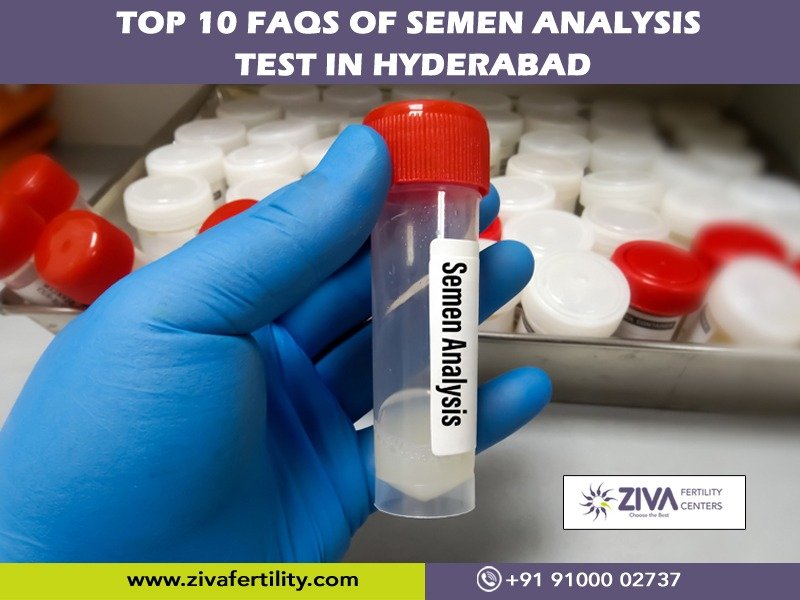In males, semen is a thick fluid that is released from the penis during ejaculation, and it contains sperm, which carries the genetic material required for conceiving. However, certain abnormalities in the sperm increase the risk of infertility. Infertility is when the couple has difficulties conceiving or maintaining the pregnancy. In staggering statistics, around 10% of people who produce sperm may be infertile or have pregnancy issues.
Infertility means issues with getting pregnant or carrying a fetus to term. Infertility can be caused by a disease or health condition affecting the reproductive tract in one or both partners.

1. When is a semen analysis test performed?
There are several circumstances in which a doctor may order a semen analysis. The most common reason for ordering this test is to evaluate fertility in a male or anyone who produces sperm. The fertility specialist will take a brief medical history or physical exam; a semen analysis is usually the first test ordered to detect fertility issues in people who produce sperm. Based on the semen analysis test results, a doctor may recommend additional testing or medical treatment to enhance fertility.
Apart from infertility, what other situations need semen analysis tests?
Doctors order a semen analysis to know the outcome of a vasectomy. Vasectomy is a surgical procedure for birth control. After the surgery, the sperm will not enter the semen. Semen test analysis after three months of vasectomy can detect if there is sperm in the semen or not. If there is no more sperm in the semen means a person is no longer fertile.
2. What are the parameters taken during a semen analysis test?
The first parameter measured is the semen volume, the total amount of semen contained in the sample. Other parameters like colour, consistency, and chemical makeup of the semen are also noted down. To know the acidic and alkaline levels of the semen, its pH is then measured.
Under a microscope, sperm count, which describes the total number of sperm in the sample, and sperm concentration, which measures the number of sperm contained in a millilitre of semen, are measured.
Sperm motility, which is the travelling rate of the sperm in the sample, is measured under two factors. If the sperm has progressive motility, it means they are mainly moving in a straight line, and if they are not moving in a straight line, it means they have non-progressive motility. Sperm morphology is another parameter which determines the shape of the sperm. An abnormally shaped sperm also leads to infertility.
Other types of measurement are sperm agglutination, which describes the clumping of the sperm. Under a microscope, professionals also check for immature germ cells, sperm cells that are not fully formed, and white blood cells called leukocytes.
3. How is the semen analysis test conducted?
A semen analysis test is conducted at a doctor’s office, and patients are sent to a private room. Before that, they are given instructions on how to collect a sample of semen via masturbation. They can also obtain a sample at home using a special condom that collects semen during sex. But in the case of home collection, the sample must be immediately brought to the testing facility.
4. Can the test be done at home?
Several home tests and home collection kits are available. The home tests allow you to collect the sample at home, measure sperm count and/or sperm motility and don’t typically provide any other assessments of semen or sperm. It is advisable to give sample at a good lab or at a fertility center.
5. What is the cost of the test?
The cost of a semen analysis is not fixed. Costs depend upon the following:
- Location of the test
- Whether other tests are performed at the same visit
So it is always better to consult with a doctor and/or the medical facility where the test is performed.
6. How does semen analysis determine infertility?

When the semen analysis is done, the doctor can get a full picture of the sperm. If the sperm has any of the following qualities, then a person can be Infertile:
- Insufficient sperm quantity
- The volume of the sperm in semen is very less.
- Improperly shaped sperm
- If the sperm lacks proper traveling speed (motility)
- Suppose the sperm is too acidic or contains allergy-causing agents. These both properties will harm the fertilization process since the female will reject such sperm.
- Any chromosomal abnormality or genetic factors might cause the inability to hold on to the pregnancy.
7. What is considered a “normal” result for semen analysis?

A healthy semen sample has the following properties:
- A concentration of sperm which is 15 million sperm per ml of ejaculate
- An ejaculate volume of at least 1.5 ml
- At least 4% of normally shaped sperm
- At least 40% moving sperm
- Minimal clumping of the sperm cells
- A normal viscosity (thickness of the semen)
8. How to prepare for a sperm analysis?
The patient should take the following precautions to get the most accurate results:
- Stay away from ejaculation for two to five days before the test.
- Consult your doctor about any medications that should be stopped temporarily.
- Do not consume caffeine, alcohol, and drugs for at least two days before the test.
- Stay hydrated since semen has a high water content, which can negatively influence the viscosity if not hydrated well enough.
9. Are there any variations in semen tests?
There are various types of semen analysis tests:
- A complete semen analysis is done to determine if there is any male infertility.
- A partial semen analysis will be used after a vasectomy to determine whether the procedure has been successful.
- Retrograde semen analysis is done in cases when the ejaculate backs up into the bladder rather than exiting through the penis.
At ZIVA fertility clinics, we conduct semen analysis tests. However, we will prescribe them only if necessary. We will educate the couple on the test’s necessity and help them understand the results. Depending on the outcomes, we will suggest the required treatments. Treatment could be medication, surgery or an ART. Please visit our website https://zivafertility.com/ or contact us at +91-9100002737, +91-9392834024
Info@zivafertility.com.
















